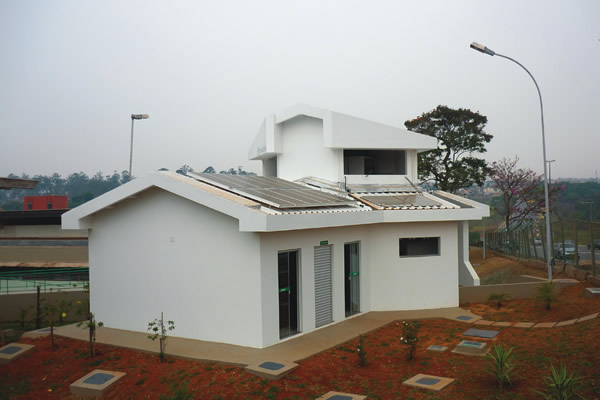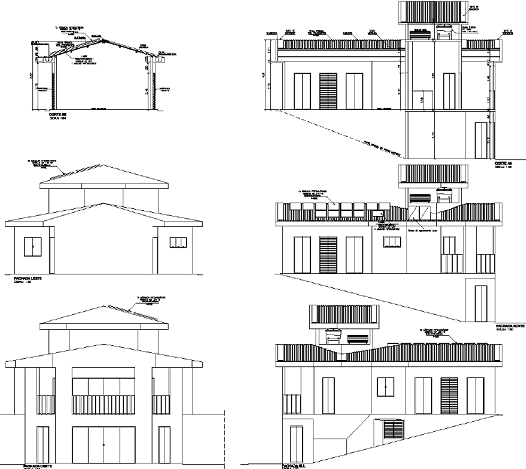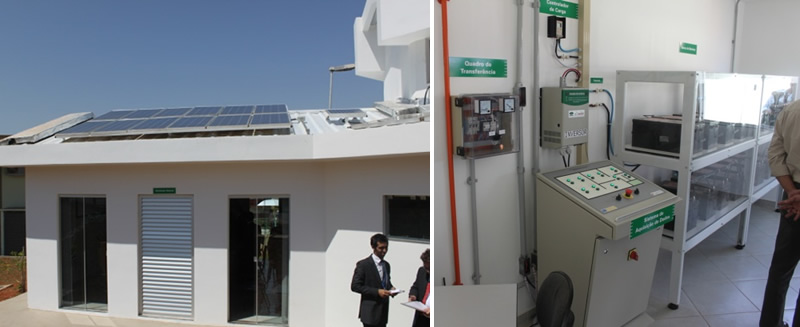Text adapted from Galdino et al. (2010).
SENAI-DF Demonstration Center is located in a building designed and built specifically for this purpose at SENAI Taguatinga (Figure 1). This building has two floors and a built area of about 124m2. It has an auditorium, dining room/ kitchen, bathroom, reception and a specific area for the installation of electrical equipment of solar photovoltaic system as well as enabling visualization of the equipment, and facilitating its maintenance (see the views of architectural design in Figure 2). The building is powered by a photovoltaic energy conversion. The water heating for bathroom / kitchen is made by a solar thermal system, while the water pumping is done by an autonomous photovoltaic system. The settings are as shown in Table 1.

Figure 1 - SENAI Demonstration Center in Taguatinga - DF
Table 1 - Characteristics of the systems of SENAI-DF Demonstration Center. | Electrical system | Sun radiation | 4.40 kWh/m2.day |
|---|
| Daily consumption | 3.5 kWh/day |
| System voltage | 48 Vcc |
| Photovoltaic array | 1560 Wp (4s * 3p * 130 Wp) |
| Battery Bank | 32.64 kWh (4s * 4p * 170 Ah @C20) |
| Solar water heating | Thermal reservoir | 200 L |
|---|
| Thermal Collector | 1 m2 |
| Water pumping | Daily consumption | 600 L/dia |
|---|
| Photovoltaic array | 54 Wp |
| Motor pump | 12 Vdc, surface, diaphragm-type |
The amount of solar radiation that was adopted on Table 4 refers to the lowest average monthly rate in the city of Taguatinga-DF, according to Atlas Solarimétrico do Brasil (UFPE, 2000).

Figure 2 - Views of the architectural design of a building in the Demonstration Center in Taguatinga (DF).
Similar to the Project Demonstration Center of SENAI-MA, the Demonstration Center of SENAI-DF will have a monitoring system of electrical magnitudes from the entire PV system. The acquisition system will have a control box allowing you to view the state of all electrical loads, as well as its remote activation (Figure 3). The measurements are transmitted via wireless network to a computer in the building of SENAI-DF, which will be stored at every second. A notebook computer inside the house will allow visitors to access the data.

Figure 3 - Map of the components of the solar photovoltaic system.
The Center will make scheduled visits, targeting students and high school teachers and university professors. It will also serve to the lay public in general. SENAI-DF also provides the use of the center for training professionals in renewable energy.
For demonstrations that are external to the premises, SENAI-DF will feature 3 Mobile Kits: power conversion kit, water pumping kit and computer kit.
4.1. Bibliography
Galdino, M.A. et al, 2010, "Criação de Quatro Centros de Demonstração de Energias Renováveis em diferentes regiões do país". In: Congresso brasileiro de Energia Solar, 3., Belém, Set.
UFPE, 2000. Atlas Solarimétrico do Brasil: Banco de Dados Terrestres. 1ª ed. Recife, Ed. Universitária da UFPE. ISBN 85-7315-142-0.